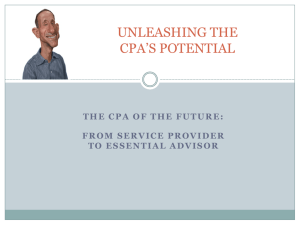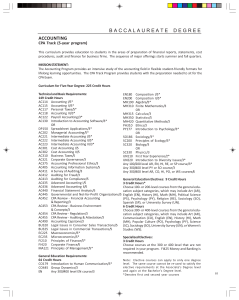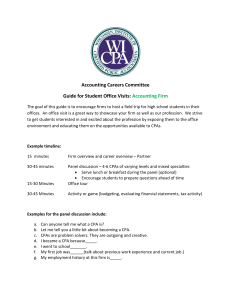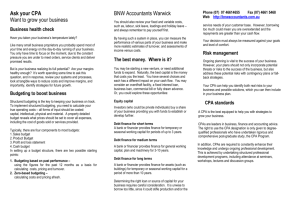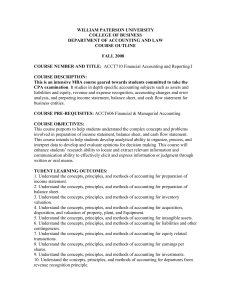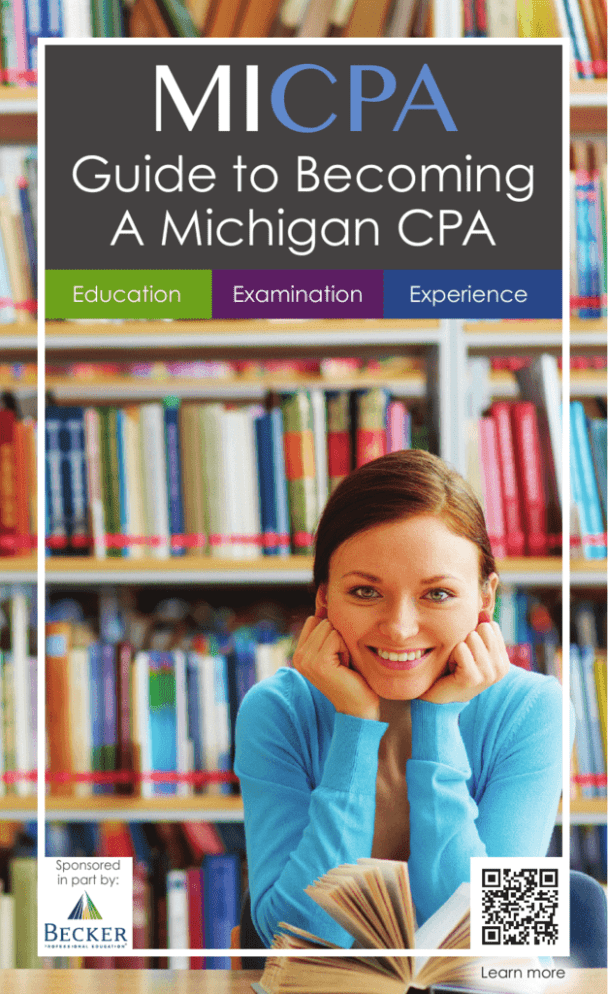
MICPA
Guide to Becoming
A Michigan CPA
Education
Examination
Experience
Sponsored
in part by:
®
Learn more
The 3 E-ssentials for
becoming a CPA
in Michigan
Education + Examination + Experience = MI CPA
Completing the steps to become a Michigan CPA can prove to be an exciting
and rewarding challenge. By now, I trust that you have already passed the
consideration phase and share with me the same deeply-rooted passion for the
profession. The CPA title is a catalyst for many opportunities, both personal and
professional, and brings with it the respect of business leaders and the community
at large. For me, being a CPA isn’t just a job, it’s a lifelong career.
The MICPA’s goal in preparing this booklet is to clarify the licensing process as
much as possible, from start to finish. Here, you’ll find clear and concise instructions
on the requirements for receiving your license, as well as answers to some of the
most common questions and helpful resources to guide you on your journey.
Whether you’re attending college, preparing for the CPA Exam or are completing
the experience requirements, the MICPA is here to help. Please don’t hesitate
to reach out to them with any questions or comments by calling their Member
Services Department at 248.267.3747. The MICPA is your resource for all things CPA!
Warmest Regards,
Paul L. Gimbutis, CPA in Public Accounting
Education
Current Michigan law requires that CPA candidates complete 150 semester
hours of college education, including a Bachelor’s degree or higher with a
concentration in Accounting, from an accredited institution. You may approach
this in one of two ways:
Obtain a Master’s degree in Accounting or a Master’s degree in Business
Administration with a concentration in Accounting. Your studies must include at
least 12 semester hours of graduate-level accounting courses. These 12 semester
hours must not include tax or information systems courses.
– OR –
If you elect not to pursue a Master’s degree, you may meet the requirements by
following this simple equation to reach 150 semester hours: 81+30+39=150
81 Hours: S tart with eighty-one semester hours of general topics and/or
prerequisites.
+
30 Hours: T ake thirty semester hours of accounting subjects, with no more than
six semester hours of taxation. Additional semester hours in accounting
subjects may be applied toward the second part of the requirement.
+
39 Hours: T op it off with thirty-nine additional semester hours, with between 3 and
12 semester hours in each of at least 5 of the following areas:
(A) Business law
(B)Economics
(C)Ethics
_____________________
(D)Finance
(E)Management
(F)Marketing
(G)Taxation
(H) Statistics
(I) Business Policy
= 150 Semester Hours
Once you’ve chosen a school, make sure to seek the counsel of an academic
advisor. They can assist you in determining the classes you need to complete
and when they should be taken. With their guidance, you won’t have to worry
about holding up your graduation due to limited course availability. In addition,
academic advisors have connections campus wide and have access to useful
resources, such as tutoring and financial aid.
Accreditation:
Michigan’s State Board of Accountancy adopts the criteria for accreditation of the
North Central Association of Colleges and Schools or an affiliated association. To see if
your prospective school is properly accredited, visit their website at www.ncahlc.org.
Examination
In order to meet the requirements for a CPA license, candidates must pass the
Uniform Certified Public Accountant Examination, a 14-hour, computer-based test
comprised of four sections: Auditing and Attestation (AUD), Business Environment
and Concepts (BEC), Financial Accounting and Reporting (FAR) and Regulation
(REG). It employs a variety of testing formats, including multiple-choice questions,
essays and task-based simulations. These are derived from condensed case
studies to test accounting knowledge and skills, using real life, work-related
situations.
CPA candidates must meet one of the two following criteria, in order to be eligible
to sit for the CPA Exam:
Have completed the curriculum required for a Bachelor’s degree with a
concentration in Accounting* from a regionally accredited U.S. educational
institution recognized by the Michigan State Board of Accountancy.
*Definition of “concentration in Accounting”:
Excerpt from Admin Rule 115
(3) A concentration in Accounting shall include all the following Accounting and
general business subjects:
(a) Auditing: 3 semester hours
(b) General business subjects: 24 semester hours
(c) 21 semester hours of Accounting Principles that shall include
study in each of the following areas:
(i) Financial Accounting and Accounting Theory
(ii) Managerial Accounting, including Cost Accounting
(iii) Accounting Systems and Controls
(iv) United States Federal Taxation
(v) Governmental/Fund Accounting
– OR –
Complete the curriculum required for a Bachelor’s degree from a regionally
accredited institution, including the following:
1. 3 semester (4.5 quarter) hours in Auditing
2.21 semester (31.5 quarter) hours in Accounting, including study in each of
the following:
a.Financial Accounting and Accounting Theory
b.Managerial Accounting, including Cost Accounting
c. Accounting Systems and Controls
d.U.S. Federal Taxation
e. Governmental/Fund Accounting
3. 24 semester (36 quarter) hours in general business subjects.
If you meet these requirements, you may apply to sit for the exam via the National
Association of State Boards of Accountancy (NASBA) website at www.nasba.org
or call CPA Exam Services at 800.CPA.EXAM (800.272.3926). Because application
and examination fees are generally non-refundable, you should not apply to sit for
a section of the exam until you’re ready. Only apply and pay exam fees for the
sections you will be taking in a six month period.
Examination
Once your application has been processed, and you have been deemed eligible
to take one or more sections of the CPA Exam and have paid all fees, you will
receive a Notice to Schedule (NTS) from NASBA. At this point, you may schedule
one or more exam testing dates through Prometric (www.prometric.com/cpa),
who administers the exam at locations nationwide. Reference the “Section ID,”
listed on the NTS, when selecting which parts you’d like to take.
The exam is offered the first two months of each calendar quarter. You must
schedule your examination appointment at least five days in advance of the
test date. However, it is recommended to schedule it at least 45 days before the
desired test date(s) to increase the likelihood you receive first choice of date, time
and location.
CPA Exam testing windows:
(You may sit for one or more sections of the exam during the periods below.
Testing is not available in March, June, September and December)
January 1 - February 28 (or 29)
April 1 - May 31
July 1 - August 31
October 1 - November 30
Choose your schedule by visiting www.prometric.com/cpa. Your NTS is valid
for one testing event for each examination section or six months for each
examination section, whichever comes first. This includes non-testing months.
Pass all four sections of the CPA Exam:
Applicants must pass all four sections of the CPA Exam within a rolling 18-month
period, beginning on the date that you sat for the first passed section. If all sections
are not passed within the rolling 18-month period, credit for any section outside
the 18-month period expires.
Experience
Practical experience demonstrates your ability to put your education into practice.
Therefore, all CPA candidates must earn 2,000 hours of qualifying experience gained
through employment in government, industry, academia or public practice. You may
accomplish this at any point during the process to obtain a CPA license, but note that
the 2,000 hours must be completed within a period of not less than one calendar year
and not more than five calendar years before your request for certification.
Experience may be gained through employment in government, industry, academia or
public practice in one or more of the following areas:
a)Audits of financial statements in accordance with the applicable standards at the
time of engagement.
b)Reviews of financial statements in accordance with the applicable standards at the
time of engagement.
c)Compilations of financial statements with complete disclosure in accordance with
the applicable standards at the time of engagement.
d)Attestation engagements in accordance with the applicable standards at the time
of engagement.
e)Other auditing in accordance with applicable standards at the time of engagement
that leads to an expression of a written opinion including any of the following:
i)Reviews regarding internal control.
ii)
Operational audits.
iii)
Compliance audits.
iv)Expressions of an opinion on financial forecasts and projections.
f)Performance of an independent internal audit function.
g)Compliance audits of government contracts performed on behalf of a government
agency that result in the issuance of an opinion or report.
h)Audits performed on behalf of a government audit agency that result in the
issuance of an opinion or report.
i)Preparation of income and nonprofit tax returns for any taxing jurisdiction.
j)Properly documented tax research.
k)Representation of a client before a government agency on a tax matter.
l)Financial forecasts, analyses, and projections.
m)Management advisory services including, but not limited to, business valuation,
forensic accounting, and fraud examination services that meet applicable
standards.
n)Management and supervision of accounting functions and preparing financial
statements for profit or nonprofit entities.
o)Professional accounting-related work in a public accounting firm.
p)Other work generally associated with the profession of public accounting.
The following will not count as qualifying experience:
a)Experience consisting of non-professional work, including recruiting, industrial
engineering, administration, bookkeeping and appraisals.
b)Paraprofessional work that does not comply with section (o), above.
Source: Experience Requirements for a CPA Certificate. LARA Department of Licensing and Regulatory Affairs.
Retrieved March 13, 2014, from http://www.michigan.gov/accountancy.
Frequently Asked Questions
Education
Q:Can the MICPA review my transcripts to see if I’ve taken all the necessary classes to
meet the education requirement?
A:Since no two institutions have identical curriculum, there is no way for the MICPA to
identify which courses you may still need to complete. Sit down with an academic
advisor at your school to discuss your coursework and determine the path you
should take. Setting students up with the right classes is their job. Trust their expertise in
your major!
Q:Which school would the MICPA recommend for pursuing a CPA license?
A:It is pivotal to choose a school that works best for you, based on your situation.
What is most important to you: cost, location, convenience or some other factor?
Michigan law requires that qualifying accounting education come from an
accredited body. Michigan’s State Board of Accountancy adopts the criteria
for accreditation of the North Central Association of Colleges and Schools or an
affiliated association.
Examination
Q:Do I need 150 credit hours to sit for the CPA Exam in Michigan?
A:
No. You only need to have completed a curriculum required for a Bachelor’s degree
for the exam. However, to become a CPA in Michigan, you will need 150 credit
hours. For more information, please review the eligibility requirements on page 2.
Q:If I successfully complete and pass all four parts of the CPA Exam, will I need to take it
again if I’m not licensed right away?
A:
Once you’ve passed the entire CPA Exam, you will not need to take it again –
whether you passed it one year ago or twenty!
Q:Is there a set order I must follow when taking the exam?
A:
You may take the CPA Exam sections in any order, but must complete all four parts
within 18-months of the date you sat for the first passed section. If you fail a section
of the exam, you may not retake it within the same testing window. Please reference
the “CPA Exam testing windows” section on page 3. When you reapply to take that
section, the NTS you receive will tell you the earliest you can sit for it.
Experience
Q:Do I need to be directly supervised by a CPA for my experience to count?
A:
No. A CPA only needs to verify your work. This person does not need to be employed
at your place of work and may be licensed in any state or jurisdiction of the United
States. The CPA should be somebody who is comfortable attesting on your behalf.
When you apply for your license, you will need to complete a form for each of the
positions you’ve held to meet the 2,000-hour requirement. The qualifying experience
must be verified by a CPA.
Visit the MICPA website to find more answers to your most frequently asked questions!
For clarification on the laws to obtain a Michigan CPA license, please call the Michigan
State Board of Accountancy at 517.241.9288 or visit the Department of Licensing and
Regulatory Affairs website at www.michigan.gov/accountancy.
AFFILIATE MEMBERSHIP APPLICATION
Dues rates and categories are based on a
July 1 through June 30 membership year
MEMBER INFORMATION
Name (first, middle, last):
Maiden Name:
Home Address:
City:
Personal Email:
Home Phone:
DOB:
Gender:
Nickname:
State:
M
Zip:
Mobile Phone:
F Mailing Preference:
SCHOOL/BUSINESS INFORMATION
Employer (or school):
Position/Title:
Phone:
Email:
Address:
City:
State:
Preferred Communication Method: Email
Phone
STUDENTS ONLY: Expected Graduation Date:
Degree:
Concentration:
Fax
Home
Business
Zip:
Mail
MEMBERSHIP CATEGORY
Student (College): Student attending an accredited college or university. Free
CPA Candidate: College accounting graduate who is preparing for or who has
passed the CPA exam, but is not yet certified. $85 + $30 one-time application fee
*To the best of my knowledge, the information contained herein is accurate. If
elected to membership, I agree to be governed by the Bylaws of the MICPA, as
well as its Code of Professional Conduct. (*Signature required)
Signature:
PAYMENT INFORMATION (CPA Candidates Only)
I agree to be charged for my membership application fee and pro-rated dues. I
understand I will be charged a pro-rated amount from the month my membership
is approved, through June 30.
American Express
MasterCard
Visa
Discover
Cardholder’s Name:
Cardholder’s Email:
Card Number:
Exp. Date:
CVV2 Code:
Signature:
Mail completed application to:
MICPA
5480 Corporate Drive, Suite 200
Troy, MI 48098-2642
By checking this box you are providing consent without obligation for Becker
Professional Education to contact you regarding their products and services.
Join the MICPA
If you haven’t already done so, I encourage you to become a member of the
MICPA. Student and CPA Candidates all enjoy the perks of membership at greatly
reduced rates.
What Can the MICPA Help You Do?
Find an Internship/Post Your Resume! – Through our Career Center website,
you can search for internships and jobs, plus post your resume for potential
employers to view!
Get Some Answers! – Call our Member Services Department at 248.267.3747
with any question about the profession and certification. We’ll find you an
answer!
Save Some Dough! – MICPA has teamed up with dozens of companies to
provide valuable discounts on products and services that matter to you,
like CPA Exam review courses!
Stay In-the-Know! – Student members receive our Student E-News
publication, packed with the latest news and information you need to
know about succeeding in your education and career!
Belong! – Be a part of the more than 90% of Michigan CPAs who are
MICPA members!
Once you receive your CPA license, let us know! No matter where you are in your
career, the MICPA will be your trusted resource for life!
We offer three simple methods to join:
1.Fill out the application on the following page, including payment
information, and mail it to the MICPA.
2.Apply online at www.micpa.org/join.
3.Call our Member Services Department at 248.267.3747.
Today the CPA Exam.
Tomorrow the world.
Today the CPA Exam.
Tomorrow the world.
You’re taking the CPA Exam because you know what passing will mean, not
just to your career, but your life. Becker Professional Education knows too.
So go with a leader. Go with Becker. Then go conquer that world out there
– like you know you can.
You’re taking the CPA Exam because you know what passing will mean, not
just to is
your
career,
but yourwith
life.the
Becker
Professional
Education
knows
too.
Becker
proud
to partner
Michigan
Association
of CPAs
to offer
with a leader.
Goqualifying
with Becker.
Then for
go conquer
out
there
a So
fullgo
scholarship*
to a
member
Becker’sthat
full world
course
tuition.
– like members
you know you
MICPA
maycan.
also qualify to receive $300 off** the full course tuition.
Becker is proud to partner with the Michigan Association of CPAs to offer
a full scholarship* to a qualifying member for Becker’s full course tuition.
MICPA members may also qualify to receive $300 off** the full course tuition.
To view scholarship details and
apply visit bit.ly/1Nm6Wxm.
view more
scholarship
ToTolearn
about details
Becker,and
apply
visit bit.ly/1Nm6Wxm.
visit
becker.com.
To learn more about Becker,
visit becker.com.
*For information regarding the scholarship and to apply visit http://bit.ly/1Nm6Wxm.
**This offer valid only on complete, four part course tuition price and cannot be combined with any other offers.
©2015 DeVry/Becker Educational Development Corp. All rights reserved.
*For information regarding the scholarship and to apply visit http://bit.ly/1Nm6Wxm.
**This offer valid only on complete, four part course tuition price and cannot be combined with any other offers.
©2015 DeVry/Becker Educational Development Corp. All rights reserved.
®
®

